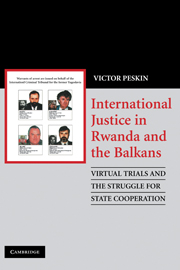 International Justice in Rwanda and the Balkans
International Justice in Rwanda and the Balkans Book contents
- Frontmatter
- Contents
- Maps and Timelines
- Acknowledgments
- Permissions
- Note on Pronunciation
- MAP 1 Map of the Former Yugoslavia
- MAP 2 Map of Rwanda
- PART I INTRODUCTION
- PART II THE BALKANS: STRATEGIES OF NON-COMPLIANCE AND INSTRUMENTS OF PRESSURE
- 2 Slobodan Milošević and the Politics of State Cooperation
- 3 International Justice and Serbia's Troubled Democratic Transition
- 4 Franjo Tuđman and the Politics of International Justice
- 5 The Politics of State Cooperation in Croatia's Democratic Era
- PART III RWANDA: VIRTUAL TRIALS, INTERNATIONAL JUSTICE, AND THE POLITICS OF SHAME
- PART IV CONCLUSION
- Bibliography
- Index
4 - Franjo Tuđman and the Politics of International Justice
Published online by Cambridge University Press: 05 September 2012
- Frontmatter
- Contents
- Maps and Timelines
- Acknowledgments
- Permissions
- Note on Pronunciation
- MAP 1 Map of the Former Yugoslavia
- MAP 2 Map of Rwanda
- PART I INTRODUCTION
- PART II THE BALKANS: STRATEGIES OF NON-COMPLIANCE AND INSTRUMENTS OF PRESSURE
- 2 Slobodan Milošević and the Politics of State Cooperation
- 3 International Justice and Serbia's Troubled Democratic Transition
- 4 Franjo Tuđman and the Politics of International Justice
- 5 The Politics of State Cooperation in Croatia's Democratic Era
- PART III RWANDA: VIRTUAL TRIALS, INTERNATIONAL JUSTICE, AND THE POLITICS OF SHAME
- PART IV CONCLUSION
- Bibliography
- Index
Summary
Introduction
In this and the next chapter, I will examine the “trials of cooperation” that have taken place between the International Criminal Tribunal for the Former Yugoslavia (ICTY) and the Croatian government. In this chapter, I will examine these “trials” during the country's authoritarian period that lasted until the electoral victory of a democratic coalition in January 2000. In the next chapter, I will examine the ICTY-Croatian government “trials” since the beginning of Croatia's democratic period.
A major aim of the Croatia case study, as with the Serbia and Rwanda case studies, is to reveal the often hidden ways in which targeted states manipulate the course of international justice. The ability of the Croatian government to thwart the ICTY underscores the extent to which its prosecutorial agenda can be shaped by the political interference of targeted states. The Croatia case, as much as the Serbia case, also demonstrates the central role that key international actors such as the United States and the European Union play in both undermining and bolstering the tribunal's quest for cooperation from targeted states. The tribunal, however, is not predestined to be an arm of either the international community or targeted states. The Croatia and Serbia case studies point to a developmental process whereby the ICTY has evolved into a strategic actor with an increasing capacity to press states to cooperate while protecting itself from external manipulation.
- Type
- Chapter
- Information
- International Justice in Rwanda and the BalkansVirtual Trials and the Struggle for State Cooperation, pp. 92 - 118Publisher: Cambridge University PressPrint publication year: 2008
